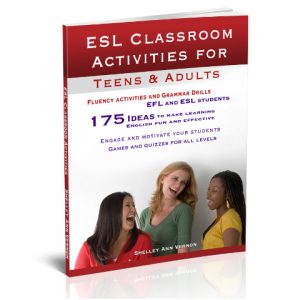All games in the following lesson plan for present simple passive voice are from Fun ESL Activities for Teens and Adults by Shelley Ann Vernon. This resource is available in instant PDF download or paperback on Amazon. In addition, you may order it from your local bookstore ISBN-13: 978-1478213796
On the other hand, if you are teaching online, my ESL Online Games book is better.
-
Games
Games and Activities for Teens and Adults
Rated 5.00 out of 5$23.96Original price was: $23.96.$18.40Current price is: $18.40. Add to cart
Lesson plan outline
- To begin, there are active and passive voice examples to answer the question, When do we use the present simple passive voice? Compare sentences using active and passive speech.
- Next, a fun Fly Swatter Game introducing the passive tense.
- Then, a Grammar Auction game, which is a calm listening exercise to decide whether sentences are correct.
- After that, play Cryptic Clues, another calm listening exercise. Read out five cryptic clues; a recipe, a famous person, something abstract, a sport, and a country. Meanwhile, students try to guess who or what it is.
- After that, play a speaking fluency drill Relay Race
- Then, play Jigsaw Listening using a song
- Next is a writing drill: Students race to convert active sentences to the passive playing Ten Important Sentences with Watermelon.
Homework
Next, assign homework tasks. For example, prepare a quiz where students come up with five questions about a famous person.
After that, students could make anagrams of present passive voice sentences for others to unravel at the next lesson.
Present simple passive explanation
Active and passive voice examples
First, discuss when we use passive speech.
– We often choose passive structures if we want to talk about an action, but not about who or what does or did it.
– However, passive speech is rarely used in spoken language (day-to-day conversations).
– The passive voice present is often used when talking about:
Processes: First, the orders are selected, then they are checked, and then they are packed, weighed, and sent to the customers.
Opinions, beliefs, and generalizations: Chinese is thought to be a difficult language. London is considered to be expensive. It is believed by some that we never landed on the moon!
FORMATION: BE (is) + past participle
Next, compare active and passive sentences, such as:
Sally is reading this book. Thing or person doing action + verb + thing receiving action
Compared to:
This book is being read by Sally. Thing receiving action + verb + past participle of verb + by + thing or person doing the action
Next, write more active sentences on the board and ask students to convert them to show they understand. Finally, have students write these examples down for the next game.
Traffic wakes me every day. / I am woken by traffic every day.
Most of South America is Spanish-speaking. / Spanish is spoken in most of South America.
Most South Americans speak Spanish. / Spanish is spoken by most South Americans.
Many Germans drink beer. / Beer is drunk by many Germans.
Present progressive or present continuous passive voice:
The doctor is examining the baby at the clinic. / The baby is being examined at the clinic by the doctor.
Tip
At first, stick to the simple present tense declination of the passive voice so as not to be too confusing! Then, later in the lesson, you may introduce the simple past passive voice.
Present simple passive grammar games
Fly swat passive tense sentences
First, demonstrate on the board with a couple of students, then play in small groups or pairs. A student reads out one of the sentences on the board. First, the teacher calls out “subject,” and students race to swat the sentence’s subject. Continue by calling out “object” and “verb.” Now, call out “subject” and roll a dice. If it’s an even number, students race to swat the subject of an active sentence. If it’s an odd number, they compete to hit the subject of a passive sentence. Repeat the demonstration using “object.” Now students should be ready to play in threes, or small groups, with one student rolling the dice and calling out the parts of speech.
Students can slap their hands down on the words rather than use fly swatters. However, fly swatters are good for the board demonstration.
Grammar Auction (listening)
Decide whether the following sentences are grammatically correct. Students play in teams. A student reads out sentence one. Those who think it’s correct stand up on the count of three. All those students who remained seated are out and go to the side of the classroom. Move on to sentence two and repeat; all those students who sit down are out since the sentence is correct. Sentence three is incorrect, so all those who sit down are in; those who remain standing are out and go to the side. Continue to the end and the team with the most players still in the game win.

- Is your hair brushed every morning?
- The film is being released at the end of the year.
- Nobody is expect to arrive before the party. (incorrect)
- He is being followed by a detective.
- Her shoes are polish every day by the maid. (incorrect)
- They are being educated in the United States.
More examples for Grammar Auction game
- The play is cancel due to technical problems. (incorrect)
- My leg is being bandaged by the doctor.
- Why isn’t the bag checked in yet?
- Vodka is drank by many Russians. (incorrect)
Cryptic Clues (listening)
Use these examples as a base but edit them to contain people or places relevant to your students. For example, instead of the Canadian basketball question, you might prefer Miley Cyrus, a top teen idol, or for South Korea, why not Se Ri Pak, the female golfer who became a national heroine. However, don’t be too cryptic, or the game will drag. Next, put students in teams and give points as follows:
– Ask students to count every occurrence of passive tense usage in the five clues. Give 5 points to each team for the correct number, 4 points if one is missed, 3 if two are missed, etc.
– Then, give 5 points to each team that guesses one of the clues. For homework, students write several clues to ask other teams which you can use to play again in the next lesson.
Examples of clues
- Banana cake: I am made out of flour, eggs, sugar, butter, and bananas. What am I?
- Famous people – Beyoncé Knowles: According to Forbes magazine, I am considered one of the richest people in the music industry. I am such a gormless dipstick that I inadvertently promoted farming wild animals since I was often photographed in fur. Who am I?
- Abstract: The Earth I am the third planet from the Sun and the fifth largest in the solar system. I am the only planet whose name is not taken from Greek or Roman mythology. What am I?
- Sports: Basketball I am bounced, passed around, and thrown into a net. I can be played indoors. I was invented by a Canadian called James Naismith because he wanted to create a game that could be played indoors during the long winters but would also be active enough to keep people fit. What am I?
- Sports: I am kicked around, but you can’t touch me with your hands. Maradona, Ronaldinho, Beckham, and Rooney were considered, amongst others, to be my greatest players. What am I? A football.
- Countries: New Zealand In my country, sheep are raised for their wool and meat. I have more sheep than people. My wines are world-renowned, as is my rugby team, which is feared and revered. My original people are the Maori. Which country am I?
Relay Race fluency drill
Play Relay Race as a speaking fluency drill. Teams pass down a simple present passive sentence, such as, “First the clothes are washed and ironed, and then they are given to the poor.” Play several times, with a different passive sentence each time.
A full description of Relay Race classroom vocabulary game is here:
Jigsaw Listening
First, cut up the lyrics of a song, one set for each small group of students. However, with a long piece of music, give each group a section of the song, not the whole thing. Next, play the song two or three times while students put the words in order. By the way, the website lyrics.com is brilliant for finding specific lyrics. For instance, in the search bar for lyrics (not artists or albums), using quotes to narrow the search, type ‘are loved,’ and you’ll find songs with that phrase. Then, go to YouTube (or your equivalent) to find the song. For example, I chose Kim Wilde, Loved, which repeats the phrase ‘you are loved’ several times. Though, for the present progressive passive voice, try Steven Curtis Chapman’s, ‘You are being loved.’
To begin with, you might want to show students how to do this and get them to select a song for jigsaw listening for the next lesson. Certainly, it’s great to involve students in creating their tasks, using songs and topics of their choice. Specifically, it involves them and helps them realize that they are responsible for their learning.
Writing drill
Ten Important Sentences with Watermelon: Divide students into teams and have a list of jumbled passive sentences on the board, a different list for each group. To begin, the first student from each team comes to the board and starts to decrypt the first sentence in their team list, but they can only work on the sentence while repeating “Watermelon” without taking a breath. When the student runs out of breath, the next student in the team comes up and takes over. As a rule, have small groups, so students don’t wait long between turns. Additionally, aim to have several students working simultaneously at the board. On the other hand, if there isn’t enough room, use large sheets of paper on the walls.
Homework
Give these quiz question examples to students and ask them to make up five questions for homework, on any topic they like. However, each question should use the passive tense. Then, at the next lesson, collect the questions and use them in a team quiz like Jeopardy or Blow Your House Down.
- Which city in ___________ (your country) is thought to be the most cultured?
- Which university is seen as the most prestigious in __________ (your country)?
- What is made out of flour, eggs, sugar, and lemon? (Lemon cake)
- What products are sold in ____________ (a famous store in your town)?
- Name three footballers who are considered to be the best in the world.
Two great books for teachers
-
Games
Games and Activities for Teens and Adults
Rated 5.00 out of 5$23.96Original price was: $23.96.$18.40Current price is: $18.40. Add to cart


2 thoughts on “Present Simple Passive Voice Lesson Plan”
Very impressive
Thanks for your comment Ewelina, I’m glad you like it. I hope it goes well when you try out the ideas. All the best, Shelley Ann Vernon.